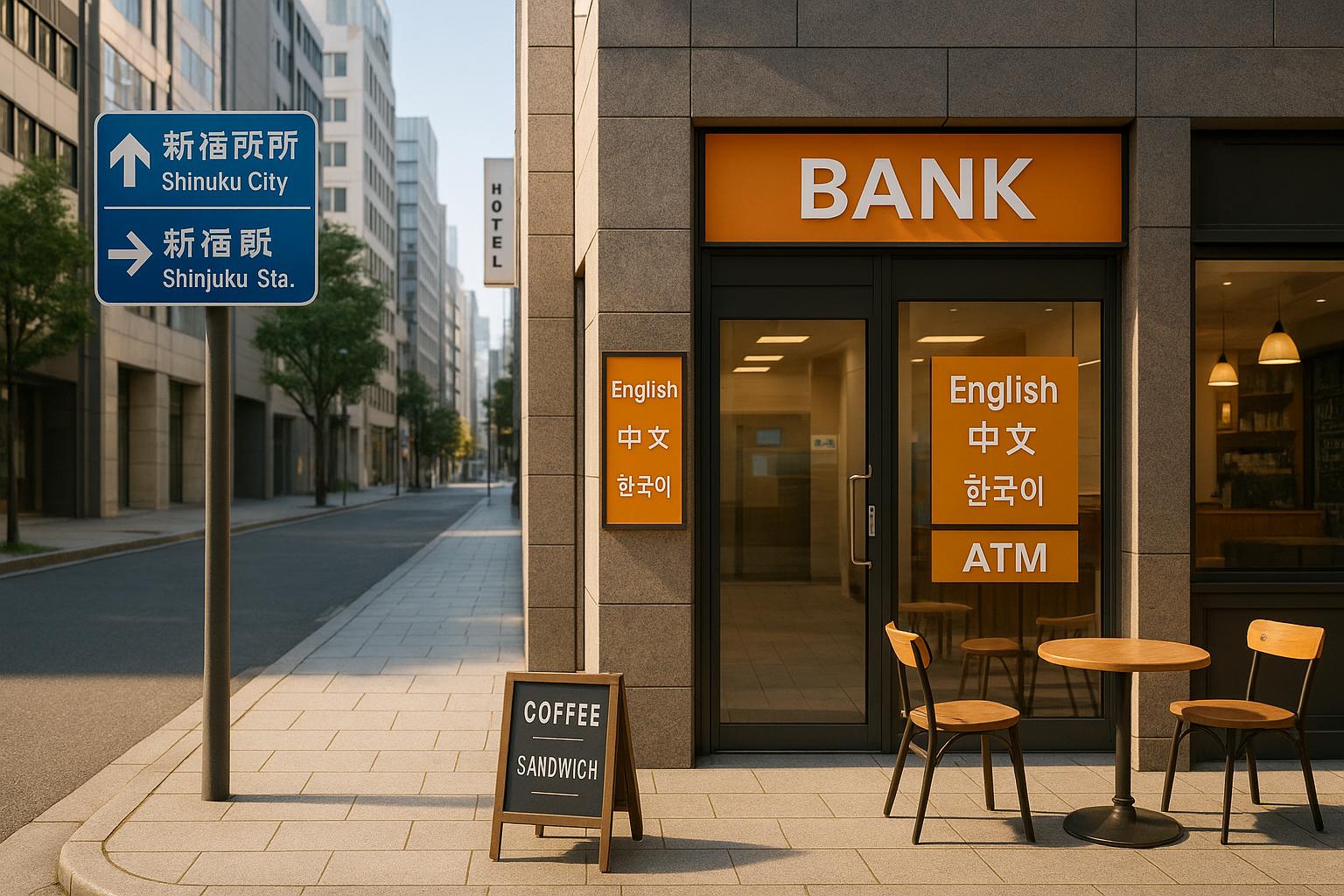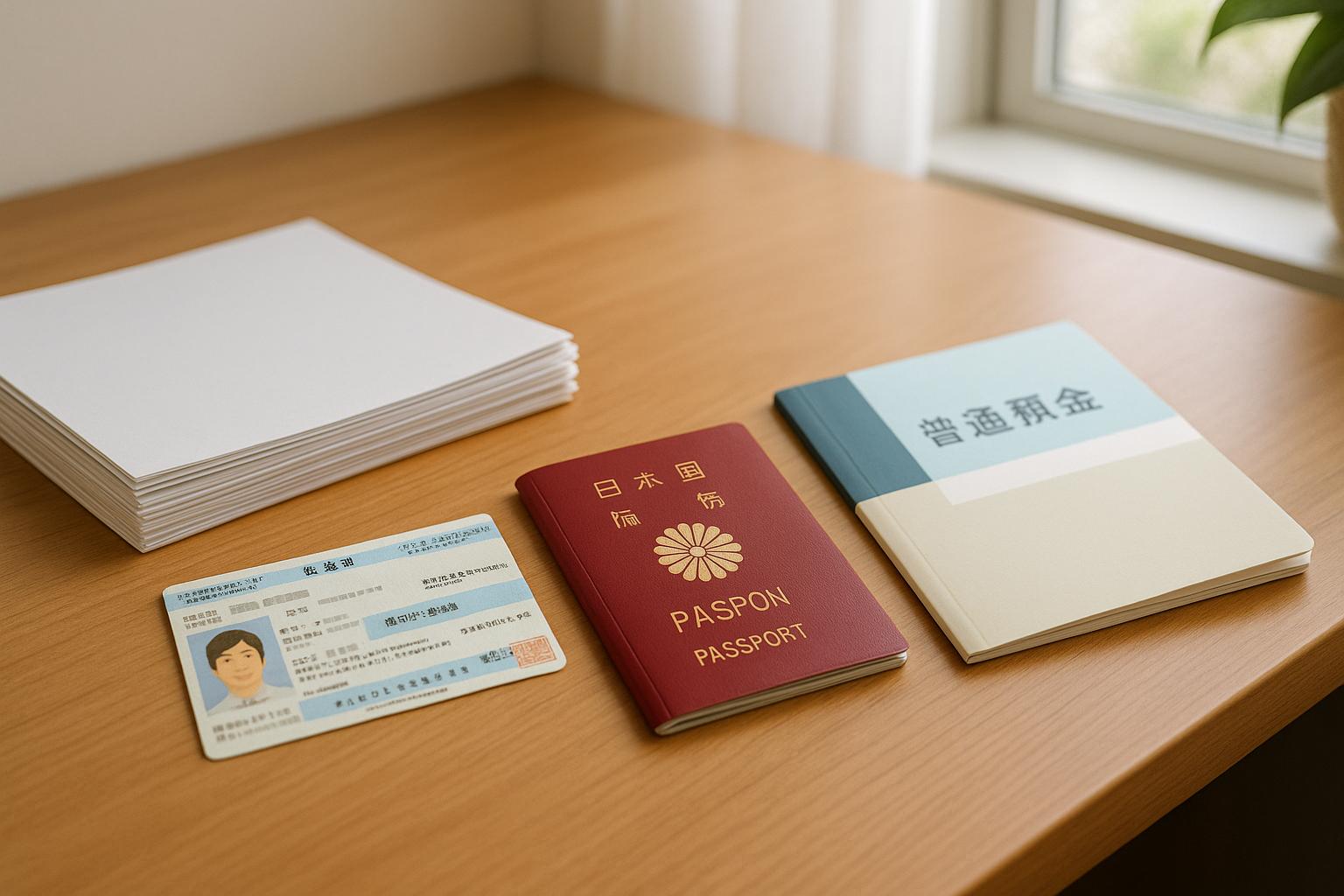Emergencies in Japan can be stressful, especially if you don't speak Japanese. Here's a quick guide to help you navigate emergency translation services and ensure you get the assistance you need.
- Key Emergency Numbers:
- Police: 110
- Fire/Ambulance: 119
- Coast Guard: 118
- Non-urgent Medical Advice: #7119
- Language Barriers: Many emergency responders primarily speak Japanese. Knowing basic phrases like "Kaji desu" (fire) or "Kyūkyū" (ambulance) can help, but translation services are often necessary.
- Translation Services:
- Japan Visitor Hotline: Call 050-3816-2787 for 24/7 support in English, Chinese, and Korean.
- Trio-Phone Civic Interpreter Service: Dial 080-7994-7196 (available Tuesday–Sunday, 9:00–19:00).
- JAF Roadside Assistance: For vehicle issues, call 0570-00-8139 or #8139.
Preparation Tips:
- Write down your address in Japanese and English.
- Save key numbers and apps like NHK World or Safety Tips for alerts.
- Use platforms like Myjin to locate English-speaking professionals.
When every second counts, knowing how to access these services and preparing in advance can make all the difference.
Emergency Numbers and Language Barriers
Emergency Numbers in Japan
Japan’s emergency system operates differently from the single-number systems used in many Western countries. Instead of dialing a universal number like 911, Japan has separate numbers for specific emergencies. Knowing these numbers is essential for getting the right help when you need it.
| Service | Number | Purpose |
|---|---|---|
| Police | 110 | Crimes, accidents, theft |
| Fire/Ambulance | 119 | Medical emergencies, fires |
| Coast Guard | 118 | Maritime emergencies |
| Non-urgent Medical | #7119 | Medical advice, consultation |
Calls to these numbers are free, even when made from public phones. For public phones, press the red emergency button before dialing, if one is available. Ambulance services, which are managed by municipal fire departments, are also free of charge, with response times averaging about 10 minutes.
However, knowing the correct numbers is only part of the equation. Language barriers can complicate communication during emergencies, making it harder to get the help you need.
Language Problems During Emergencies
One of the biggest challenges in Japan’s emergency response system is the limited English proficiency among responders. This can lead to miscommunication, especially when it comes to pronouncing Japanese addresses or understanding local emergency procedures. The U.S. Embassy & Consulates in Japan emphasizes the importance of clear communication in emergencies:
"In case of an emergency in Japan, being able to communicate with the emergency dispatcher can literally be a life-saver."
The impact of these language barriers was starkly evident during the Great Hanshin-Awaji Earthquake in 1995, where the mortality rate among foreigners was twice that of Japanese citizens. Adding to the problem, nearly 95% of hospitals in Japan lack medical interpreters, and over 76% of foreigners have expressed the need for simpler Japanese during emergencies.
Learning a few basic phrases can make a big difference. For instance, knowing how to say "Kaji desu" (fire) or "Kyūkyū" (ambulance) can save precious time. If your Japanese skills are limited, asking for help from a nearby Japanese speaker is often the quickest solution. But since this isn’t always possible, especially in critical situations, the availability of reliable emergency translation services becomes even more important.
14Orientation to Daily Living Emergency Phone Numbers (110 and 119)
Emergency Translation Services in Japan
When emergencies arise, language barriers can make already stressful situations even more challenging. Thankfully, several translation services in Japan ensure that non-Japanese speakers can access critical emergency resources and communicate effectively.
Japan Visitor Hotline
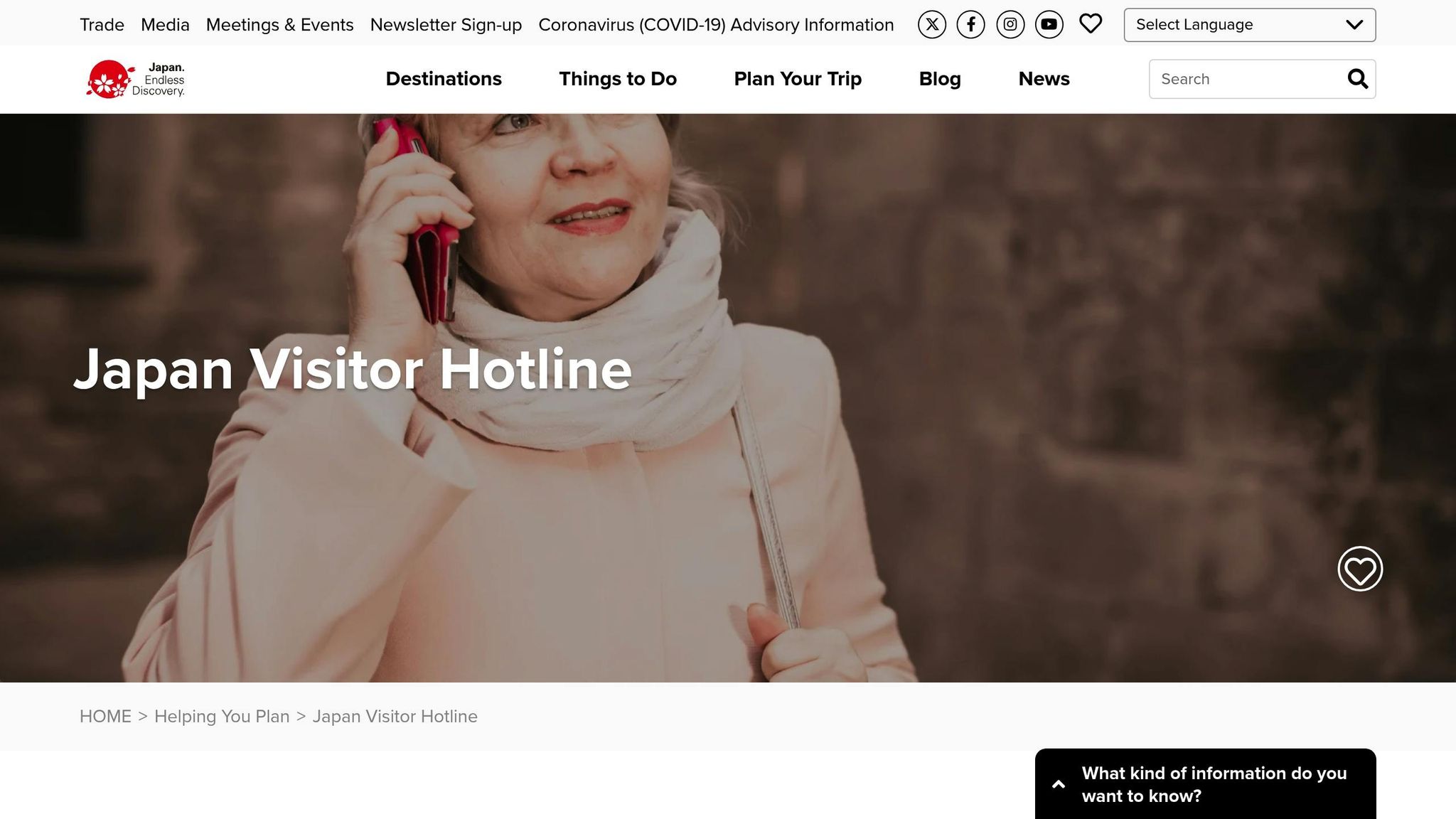
The Japan Visitor Hotline is a lifeline for non-Japanese speakers in emergencies. You can reach it by dialing 050-3816-2787 within Japan or +81-50-3816-2787 from overseas. This service operates 24/7, year-round and provides support in English, Chinese, and Korean. The hotline connects callers with local emergency services, ensuring vital information is conveyed quickly and accurately when time is of the essence.
Trio-Phone Civic Interpreter Service
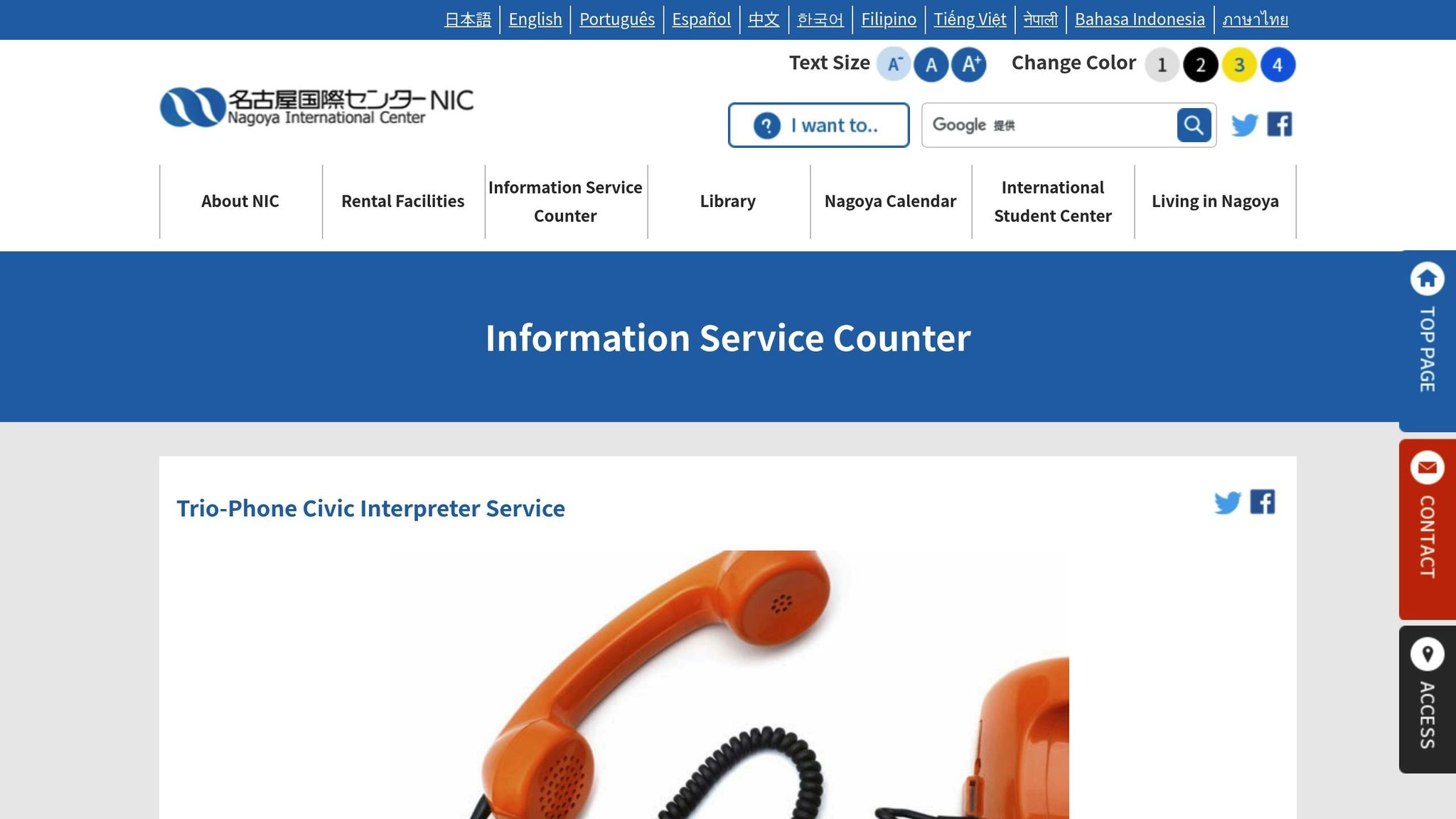
Another helpful resource is the Trio-Phone Civic Interpreter Service. You can contact them at 080-7994-7196. English interpretation is available Tuesday through Sunday, from 9:00 to 19:00. Support for other languages is also offered, but availability varies depending on the day and time, so it’s worth checking in advance if you might need assistance.
JAF Emergency Roadside Assistance
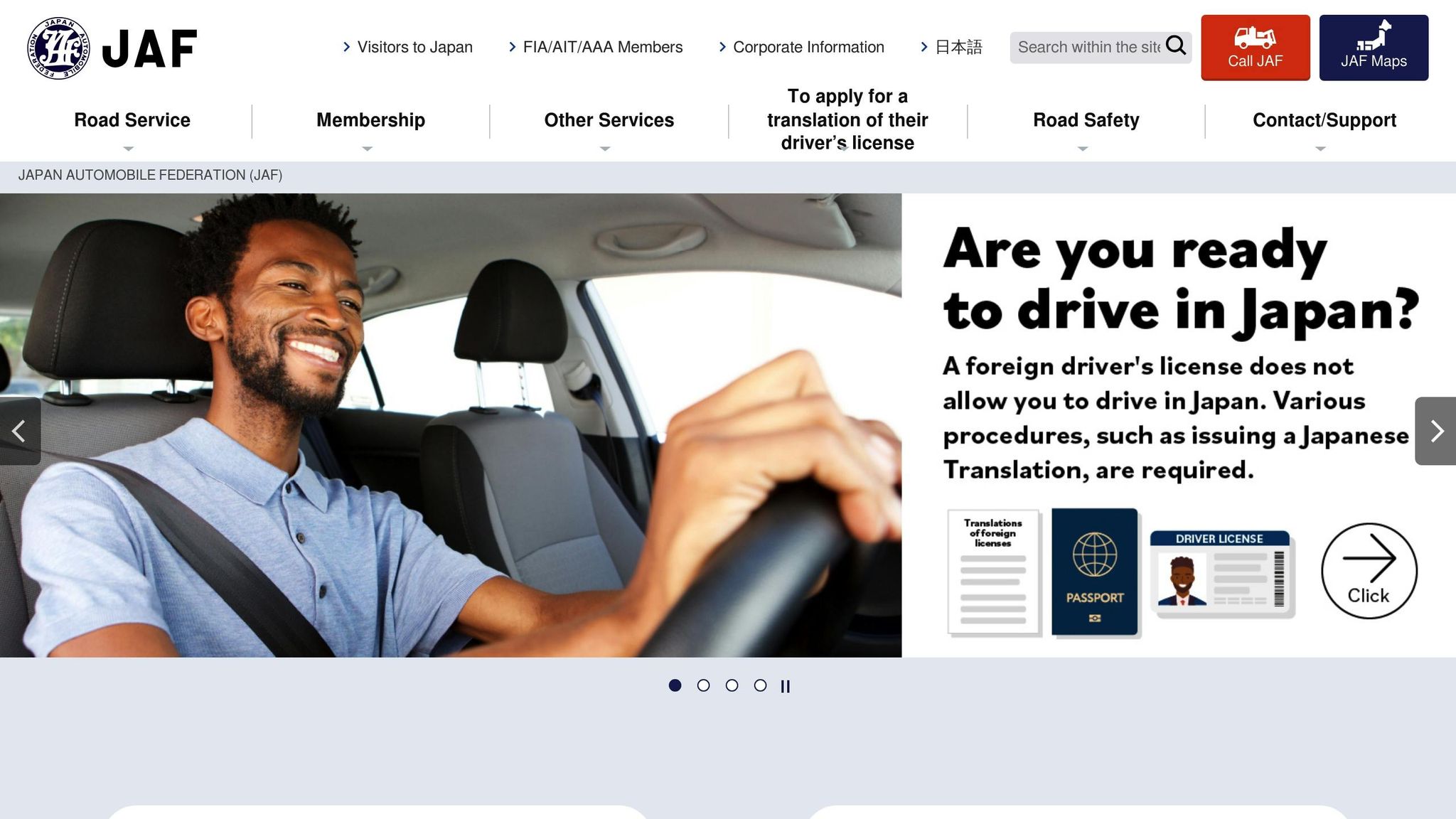
If you encounter a vehicle emergency, the Japan Automobile Federation (JAF) provides interpreter-supported roadside assistance. Call 0570-00-8139 or dial #8139 from your mobile phone. JAF's multilingual service can help with roadside emergencies, insurance-related communication, and coordination with local authorities to ensure smooth handling of the situation.
These services are essential for non-Japanese speakers, bridging communication gaps during emergencies and ensuring that critical details are understood when time is of the essence.
sbb-itb-cbc0cbb
How to Use Emergency Translation Services
Now that the basics of emergency numbers and language barriers are covered, here’s how to quickly get translation assistance when it matters most.
How to Request Language Help
If you need help during a medical emergency, dial 119 for fire, ambulance, or rescue services. Using a public payphone? Press the red emergency button before dialing to connect.
In cities like Tokyo, you might find English-speaking operators ready to assist. If English support is required, ask for it clearly and speak slowly to ensure understanding.
Make sure you’re ready with the necessary details before placing the call.
Preparing Important Information
Having the right information at hand can save precious time. Be prepared to share these key details:
- The type of emergency
- A brief description of the incident
- Your location
- Your name
- Your phone number
Clear communication can make all the difference.
Using Online Directories for Emergency Services
When emergencies strike, having quick access to reliable, foreigner-friendly services can make all the difference. Online directories are a lifeline for finding healthcare providers, legal assistance, and other essential services that offer English support, tailored to meet the needs of international residents in Japan. These tools work hand-in-hand with emergency translation services, ensuring you have access to the help you need when it matters most.
How to Use Myjin for Emergency Services
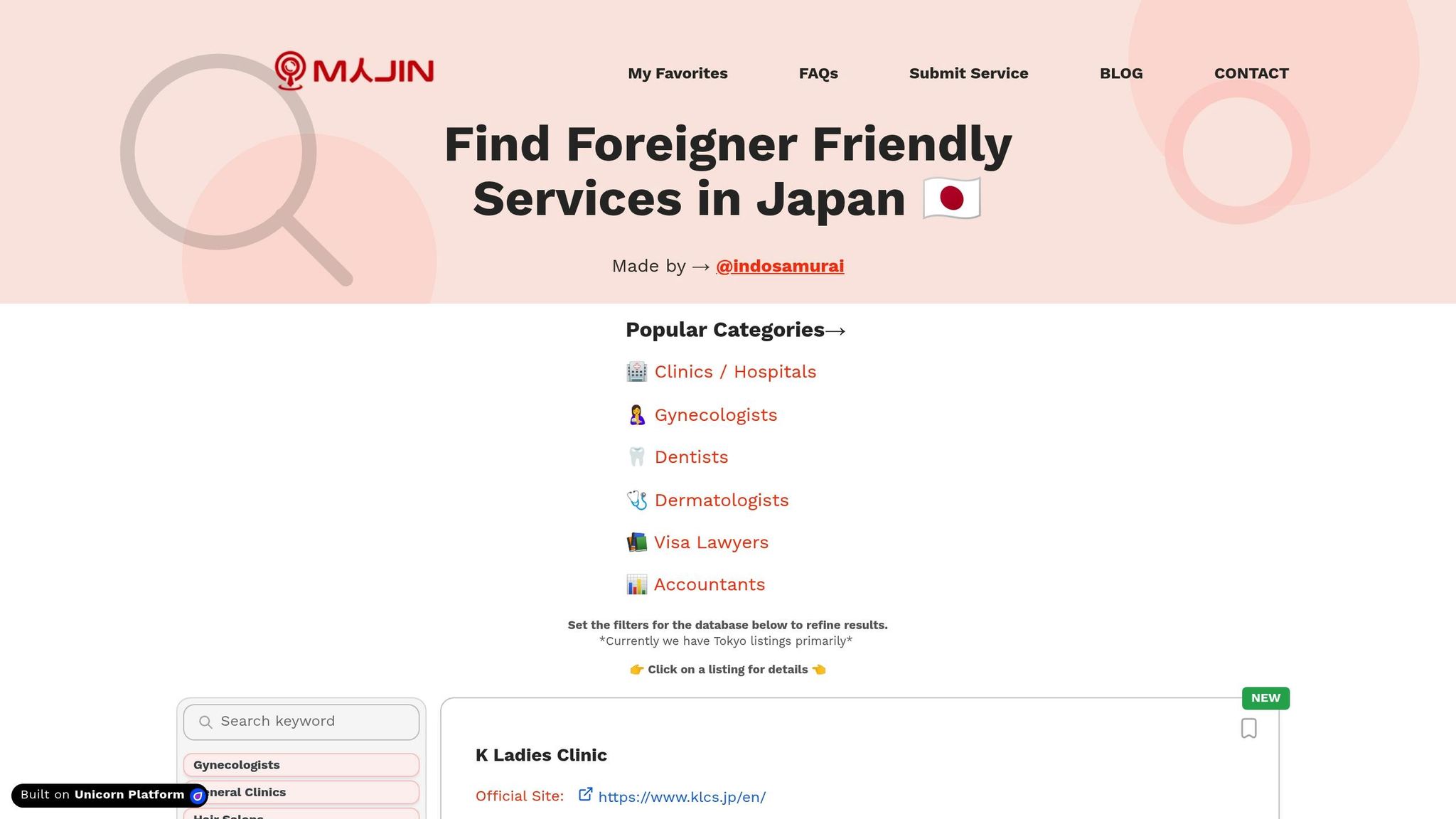
In addition to translation services, platforms like Myjin (https://myjin.jp) are an important part of any emergency plan. Myjin offers a curated directory of verified services specifically designed to assist non-Japanese speakers across Japan. Whether you need a general practitioner, gynecologist, dentist, dermatologist, visa lawyer, or tax accountant, Myjin connects English-speaking users with professionals who can help.
Using Myjin is straightforward. Start by visiting the website and navigating through the relevant categories. For medical emergencies, explore the general clinics or specialist sections to find providers who cater to foreign patients. Each listing includes vital information like contact details, websites, and directions, making it easy to locate the help you need.
For legal emergencies - such as visa issues or situations requiring official documentation - Myjin’s legal services section can be a lifesaver. Every service provider listed undergoes a verification process to ensure they offer genuine English-language support, so you can focus on resolving your situation without added stress.
Checking Service Details
Preparation is key to handling emergencies smoothly, and Myjin can help you stay ready. Take time to review and bookmark important information from the platform in advance. Each listing includes critical details like operating hours, contact numbers, and the scope of language support offered.
Pay close attention to clinics with after-hours services. Some providers listed on Myjin extend their availability into evenings or weekends, offering emergency hotlines that can be invaluable during off-hours crises. Be sure to note any special procedures or requirements for accessing urgent care, as some clinics may need advance notice or follow specific protocols.
Location details and directions are also included in Myjin's listings. Having these saved - whether as bookmarks or screenshots - can save you precious time during an emergency. It’s a smart idea to keep the contact details and addresses of services near your home and workplace handy, ensuring help is never far away when you need it most.
Final Tips
Stay prepared by downloading apps like NHK World and Safety Tips (developed by the Japan Tourism Agency) for real-time alerts in English. These apps are invaluable during natural disasters or other urgent situations, keeping you informed when it matters most.
Pair these tools with a solid personal emergency plan. Familiarize yourself with how to contact the police (dial 110) and emergency services like fire or ambulance (dial 119) in Japanese. It’s a good idea to write down your address in both English and Japanese and keep copies in your wallet, phone, and at home.
As part of your preparation, assemble an emergency toolkit. Include a list of important phone numbers and the locations of nearby hospitals. Having these details at your fingertips can save critical time when every second counts.
For added security, bookmark Myjin’s verified listings so you can quickly access essential contacts during emergencies. Save offline details for English-speaking healthcare providers, legal professionals, and other key services near your home or workplace. This way, you’ll be ready even if internet access is unavailable.
Finally, combine phone-based translation tools with pre-established contacts. Translation apps are great for immediate language support, but building relationships with English-speaking service providers through platforms like Myjin ensures you have a reliable safety net when emergencies arise.
FAQs
What can I do if I have trouble communicating with emergency responders in Japan due to language barriers?
If you're struggling with language barriers while communicating with emergency responders in Japan, there are a few ways to make things easier. Japan's emergency services often provide interpretation support, so you can ask for help in English or other major languages by clearly explaining your situation. Another handy option is using a mobile translation app like Google Translate. It offers quick translations and even has offline features for basic phrases.
For more specialized help, companies like Emergency Assistance Japan Co., Ltd. provide multilingual interpretation services. It’s also smart to learn some essential Japanese phrases or keep a phrasebook with you for emergencies. Having these tools ready ahead of time can save you precious moments when every second counts.
What should I do in an emergency in Japan if I don't speak Japanese?
If you don’t speak Japanese, being prepared for emergencies is essential. Many areas offer emergency translation services, including interpreter hotlines and apps that can help you communicate with first responders or healthcare providers.
Translation apps like Google Translate can also be a lifesaver for quick communication. In cities like Tokyo, on-call interpreter services are available specifically for emergencies. It’s smart to keep a list of key phone numbers, such as emergency services and your embassy, and to familiarize yourself with resources that provide disaster updates in English.
For less urgent situations, platforms like Myjin can connect you with foreigner-friendly services, such as English-speaking clinics and legal assistance. Taking these steps in advance can make handling emergencies far less stressful.
What apps or platforms provide emergency alerts and information in English while in Japan?
Yes, there are trustworthy apps and platforms that deliver real-time emergency alerts and information in English for people living in Japan. The NERV Disaster Prevention App provides updates on earthquakes, tsunamis, and volcanic activity. Similarly, the Yurekuru App sends notifications just seconds before an earthquake strikes. Additionally, Japan’s official J-Alert system ensures vital updates are shared during emergencies.
These resources are essential for helping English speakers stay aware and ready in the event of natural disasters or other urgent situations in Japan.
